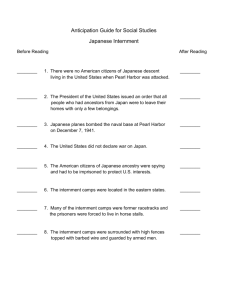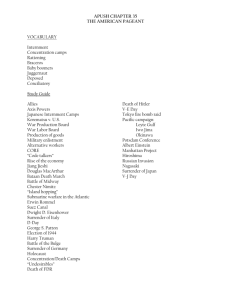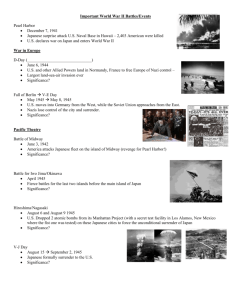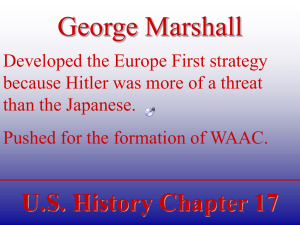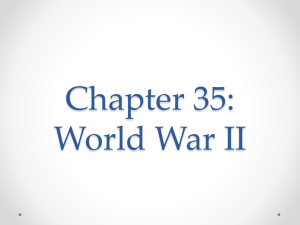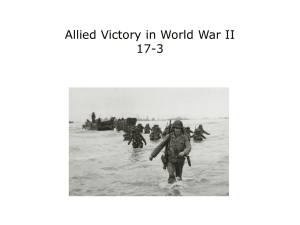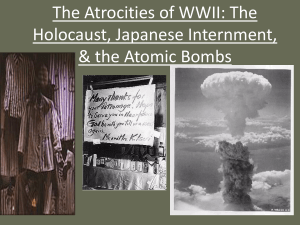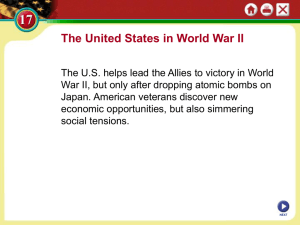World War II Review
advertisement
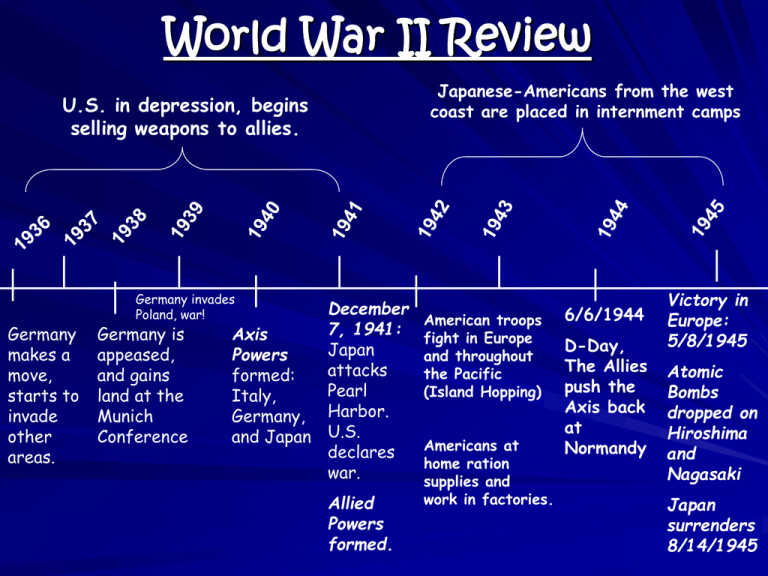
World War II Review Japanese-Americans from the west coast are placed in internment camps U.S. in depression, begins selling weapons to allies. Germany makes a move, starts to invade other areas. Germany invades Poland, war! Germany is appeased, and gains land at the Munich Conference December 7, 1941: Axis Japan Powers attacks formed: Pearl Italy, Germany, Harbor. and Japan U.S. declares war. Allied Powers formed. American troops fight in Europe and throughout the Pacific (Island Hopping) Americans at home ration supplies and work in factories. 6/6/1944 D-Day, The Allies push the Axis back at Normandy Victory in Europe: 5/8/1945 Atomic Bombs dropped on Hiroshima and Nagasaki Japan surrenders 8/14/1945 Munich Conference (1938) 1.) Germany, France and Britain 2.) Hitler said he didn’t want any more territory, that was enough. France and Britain said okay = appeasement Fooled You! 1939 – Hitler invades the rest of Czechoslovakia! Axis Powers Germany Adolf Hitler Italy Benito Mussolini Japan Military leaders (Emperor) www.answers.com www.users.bigpond.com Allied Powers Soviet Union Joseph Stalin France Charles De Gaulle Britain Winston Churchill United States Franklin D. Roosevelt United States helps in the war The Neutrality Act banned the U.S. from selling goods to warring nations Changed to “Cash and Carry” plan – U.S. could sell arms to allies if they paid cash and carried them in their own ships What’s the point of that? Gave Britain 50 old destroyers in exchange for 99 year leases on military bases in Newfoundland and the Caribbean. So what did the U.S. get in return for the destroyers? The U.S. built up its armed forces FDR was elected to a 3rd term – broke the 2 term precedent set by George Washington – in 1953 an amendment was made to the Constitution that made serving more than 2 consecutive terms illegal! Lend-Lease Act Allowed loans or sales of arms to countries vital for the defense of the United States FDR urged Americans to support the “Four Freedoms” 1. freedom of speech 2. freedom of worship 3. freedom from want 4. freedom from fear December 7, 1941 “A day which will live in infamy.” -Franklin D. Roosevelt The Japanese surprise attack on Pearl Harbor was a turning point for the United States. Congress declared war on Japan the following day, and joined the Allied forces against the Axis forces. Photograph taken from a Japanese plane during the torpedo attack on ships at Ford Island. The explosion is from a torpedo strike on the USS West Virginia. http://en.wikipedia.org/wiki/Attack_on_Pearl_Harbor Japanese-Americans WWII -Discriminated against after the attacks on Pearl Harbor -Relocated from the West Coast into internment camps Why? It was an issue of national security! During World War II, over 100,000 JapaneseAmerican individuals, the vast majority of which were actually American citizens, were rounded up and shipped eventually to internment camps. These consisted of poorlyconstructed barracks surrounded by barbed wire, sentry posts and armed guards. genealogytrails.com/ww2/PearlHarborPhoto02.jpg www.mindfully.org/Reform/2006/Bush-Detention-... www.bookmice.net/darkchilde/japan/camp.html They were put in these camps because either they or their parents or ancestors were from Japan and, as such, they were deemed a "threat" to national security. Japanese-American Camps The Japanese were easy to identify because of their appearance. There was no similar largescale roundups of German or ItalianAmericans, even though we were also fighting them during World War II. www.ymca.net/.../member_news_2006_12_page_2. html Korematsu v. United States (1944) In Korematsu v. United States, the Supreme Court held that the wartime internment of American citizens of Japanese descent was constitutional. The War Effort at Home Women worked in factories producing airplanes, tanks, and ships. “Rosie the Riveter” is a symbol of their accomplishments. Many bought war bonds or planted victory gardens. Everyone received ration books that limited their use of everyday items. Rationing – Limiting the amounts of goods people could buy What is the point of rationing??? During World War II… Save… 30,000 razor blades 30 lipstick tubes 2,300 pairs of nylons 1 pound of fat 2,500 tons tin, and 190,000 tons steel Can Be Made Into… 50 machine guns 20 ammunition cartridges 1 parachute 1/3 pound of gunpowder 5,000 tanks June, 1944: D-Day Invasion The Allies made a sneak attack on the beaches of Normandy (North Western France). 3 Million troops were led by General Eisenhower It was tough – but the Allies won! Battle of the Bulge December, 1944 Germany fights back and pushes part of the Allie force back V-E Day: May 8, 1945 The Allied Forces are victorious in Europe. Europe has to rebuild, and the U.S. has to finish the war with Japan. War with Japan The U.S. fought Japan throughout the Pacific. “Island Hopping” is a nickname for the strategy of capturing Japanese-controlled islands one by one. Tough Decisions Franklin D. Roosevelt died in April, 1945 and It was up to his Vice President, Harry Truman, to end the war. Problem: Japan wouldn’t surrender! They were ruthless and it seemed the only option was to invade Japan…which could lead to thousands of American casualties. Was there another way to end this terrible war??? The United States was secretly testing a new weapon; a weapon SO powerful people weren’t even sure of the possible consequences. Truman decided to drop the atomic bomb on Japan to force them to surrender. In July, 1945 he warned Japan to surrender or be destroyed (but he didn’t mention the bomb..). The response: No! August 6, 1945: The Enola Gay bombed Hiroshima (a Japanese port city). Result: Japan doesn’t surrender. 70,000 are killed…and counting! August 9, 1945: Nagasaki bombed. Result: 40,000 killed…and counting! Japan Surrendered on August 14th. Results of World War II “Deadliest War in History” 30-60 million dead Almost 12 million victims of the Holocaust, those responsible charged at the Nuremberg Trials Israel established as a homeland for Jews More Results… United Nations replaced League of Nations Germany broke into zones controlled by Allies Japan “rebuilt” by the Allies THE COLD WAR – Nuclear arms race between United States and the Soviet Union
